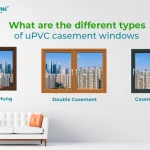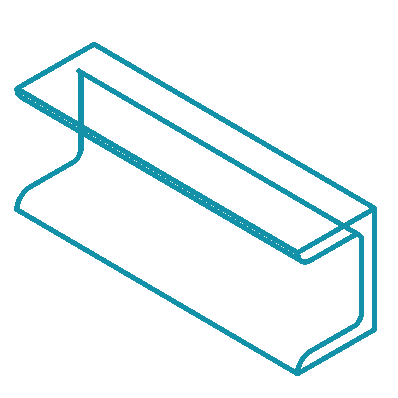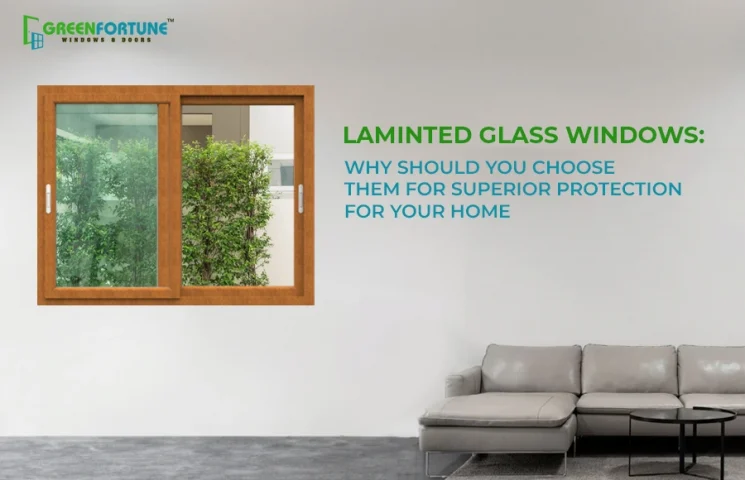
uPVC doors vs WPC doors: Which One to Choose for Your Home?
October 8, 2024
Knowing the Various Types of uPVC Casement Windows
October 10, 2024Selecting the right type of windows can create a huge difference when it comes to safeguarding your home. Laminated glass windows are increasingly becoming a better solution in terms of safety. These innovative windows offer myriad benefits in addition to the regular glass options and make the best thing people can look forward to in terms of safety, comfort, and energy efficiency.
Laminated Glass vs. Toughened Glass: All of the Key Differences.
Knowing the difference between laminated glass and toughened glass will give you the choice for a justified solution in application at home or in a commercial space. Each has a special role or purpose in which it performs better than the other.
Laminated Glass
Laminated glass is a type of glass that has two or more layers of glass cemented by another layer of plastic, usually polyvinyl butyral (PVB), in between. Such a structure holds the glass together upon shattering, due to the plastic interlayer that keeps the glass from breaking into perilous shards. It is for this reason that laminated glass makes improvements in both security and safety. Besides, it offers excellent soundproofing and UV protection, making laminated glass appropriate not only in reducing noise but also in protecting the interiors from sun rays. Breakage resistance through holding its integrity in case of impacts also makes the use of laminated glass qualified in storm- or vandalism-prone areas.
Toughened Glass
It is also known as toughened glass since it is created by the process of heating the glass mixture at very high temperatures, followed by rapidly cooling it down.
It is called toughened because the strengthening process makes the glass more resistant to thermal stresses and impact than regular glass. Because it is treated, when toughened glass breaks, it readily pulverizes into small blunt pieces rather than sharp shards, hence posing a minimal risk of injury. Toughened glass is very strong and has a great deal of resistance to considerable force; hence, it is used widely in high-strength and safety applications such as shower doors, partitions made from glass, and facades.
Whereas toughened glass doesn't have acoustic insulation, it doesn't provide protection from UV rays, and upon breaking, the fragments don't hold together—considerations depend on your needs. In summary, if laminated glass excels at safety, raising soundproofing, and UV protection because it holds together in case of shattering, toughened glass unveils superior strength and durability, with duration focused on reducing injury from breakage.
The two types have a different set of benefits and ideal applications; therefore, priorities on security, comfort, and functionality choose which one works best.
Enhanced Security
Security features are one of the major benefits of having laminated glass windows. The layer termed 'laminated' is a safeguard against burglary; because of it, the glass won't shatter when someone planning a crime forcibly enters it. With additional security, unwanted elements are kept away from infiltrating your home, which means protection for you and your family.
Increased Impact Strength
Laminated glass is very strong in its impact resistance. Accidental blows, strong weather, and even vandalism will probably not damage that type of glass. This ability comes in handy for homes located in areas prone to storms or high winds. Be confident that laminated glass is your window solution for achieving the worst of cases with ease and maintaining your home's integrity from impacts.
Noise Reduction Benefits
Aside from the penetration-resistance property, laminated glass reigns supreme in sound control. The plastic interlayer is the most effective damper system that reduces sound transmission. This means it would be offering an incredibly increased comfort level, resulting in the quietest and, perhaps, most relaxing place where one can reside.
Energy Efficiency
Laminated glass will also help enhance the energy efficiency of the house. The interlayer reduces the transmission of heat to the other side of the window and provides insulation for the house, reducing its energy-cost effect. Therefore, it reduces heat that may escape or enter from or to the outside world, respectively, through your windows, keeping the temperature on the inside constant. Therefore, this not only optimizes expense but also ensures a kinder environment for sustainability.
UV Protection
Another reason laminated glass is chosen is that it filters UV radiation. The interlayer filters a considerable amount of the ultraviolet radiation, thereby protecting furnishings, flooring, and artwork from fading over time. This added layer of UV protection thus helps in maintaining the aesthetic finesse of the interior spaces.
Aesthetic Versatility
Laminated glass windows are available in numerous styles and finishes that make it possible for you to make your choices in designs based on whatever will complement your home. Whether you opt for clear, tinted, or decorative glass, laminated windows make sure that you get flexibility without loss of performance. Thus, it is easy to go after increasing functionality with appealing looks in your choice of windows. Personalized laminated glass windows will help in safeguarding your home from various problems like safety, conserving energy, security, and energy efficiency.
Conclusion
Therefore, a homeowner can consider this to be a one-shot solution to most of his needs. An investment in laminated glass would not only be spending for the safety and comfort of your home but for the long-term value of your money. When looking to get new windows for your home, laminated glass is a wise and dependable choice; it means you will attain peak performance without any worry.
Frequently Asked Questions
Is the laminated glass transparent?
Yes, laminated glass can be clear. The glass layers and the interlayer—which is usually polyvinyl butyral, or PVB—are designed to be transparent, much like standard glass. In other words, this interlayer does not blur the clarity of glass, so that views will also remain very clear while a stronger level of safety and security is obtained. On the other hand, there are tinted or frosted variations for laminated glass if another aesthetic has to be achieved or for different levels of privacy where required.
How is safety improved with laminated glass?
Laminated glass improves security by holding itself together in case it shatters. The plastic interlayer helps to hold the glass intact and does not break into dangerous shards. So, it becomes tougher for a burglar or intruder to break through since the interlayer will form a barrier, making the window very difficult to force an entry through. Thus, this property of laminated glass is one of the most preferred choices for security enhancements in houses and buildings.
What are the advantages of toughened glass?
Tempered glass has the following advantages: it is strong and less prone to breakage. Tempered glass is achieved by heating the glass and then rapidly cooling it. These features provide two aspects of better resistance to impact and thermal stress compared to regular glass. On breaking, it pulverizes into very small, blunt fragments that are less likely to cause injury. Such toughened glass shall be used in many areas where strength is required. On its own, it remains suitable for shower doors, glass facades, and most of the safety barriers. But it neither resists sound nor protects against UV radiation.







